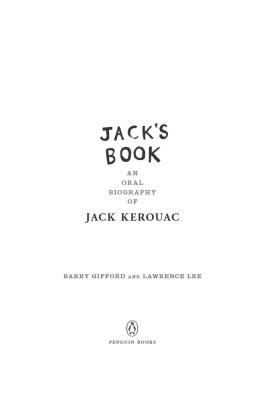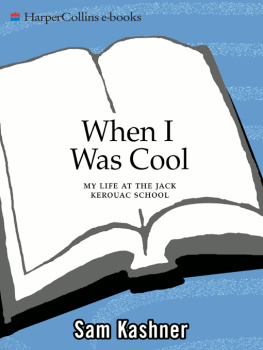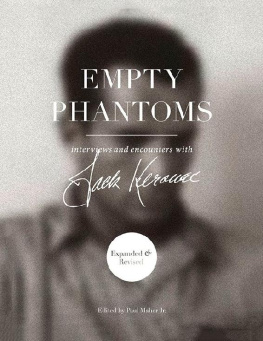
THE VOICE IS ALL
ALSO BY JOYCE JOHNSON
FICTION
In the Night Caf
Bad Connections
Come and Join the Dance
(Joyce Glassman)
NONFICTION
Missing Men: A Memoir
Door Wide Open: A Beat Love Affair in Letters, 19571958
(with Jack Kerouac)
What Lisa Knew: The Truths and Lies of the Steinberg Case
Minor Characters: A Beat Memoir
THE VOICE IS ALL
The Lonely Victory of
JACK KEROUAC
Joyce Johnson
VIKING
VIKING
Published by the Penguin Group
Penguin Group (USA) Inc., 375 Hudson Street, New York, New York 10014, U.S.A. Penguin Group (Canada), 90 Eglinton Avenue East, Suite 700, Toronto, Ontario, Canada M4P 2Y3 (a division of Pearson Penguin Canada Inc.) Penguin Books Ltd, 80 Strand, London WC2R 0RL, England Penguin Ireland, 25 St. Stephens Green, Dublin 2, Ireland (a division of Penguin Books Ltd) Penguin Books Australia Ltd, 250 Camberwell Road, Camberwell, Victoria 3124, Australia (a division of Pearson Australia Group Pty Ltd) Penguin Books India Pvt Ltd, 11 Community Centre, Panchsheel Park, New Delhi 110 017, India Penguin Group (NZ), 67 Apollo Drive, Rosedale, Auckland 0632, New Zealand (a division of Pearson New Zealand Ltd) Penguin Books (South Africa) (Pty) Ltd, 24 Sturdee Avenue, Rosebank, Johannesburg 2196, South Africa
Penguin Books Ltd, Registered Offices: 80 Strand, London WC2R 0RL, England
First published in 2012 by Viking Penguin, a member of Penguin Group (USA) Inc.
10 9 8 7 6 5 4 3 2 1
Copyright Joyce Johnson, 2012
All rights reserved
Grateful acknowledgment is made for permission to reprint excerpts from Windblown World: The Journals of Jack Kerouac, 19471954, edited by Douglas Brinkley. Copyright The Estate of Stella Kerouac, John Sampas, Literary Representative, 2004. Used by permission of Viking Penguin, a member of Penguin Group (USA) Inc.
LIBRARY OF CONGRESS CATALOGING IN PUBLICATION DATA
Johnson, Joyce, date.
The voice is all : the lonely victory of Jack Kerouac / Joyce Johnson.
p. cm.
Includes bibliographical references and index.
ISBN: 978-1-101-60106-8
1. Kerouac, Jack, 19221969. 2. Authors, American20th centuryBiography. 3. Beat generationBiography. I. Title.
PS3521.E735Z733 2012
818.54dc23
[B] 2012000603
Printed in the United States of America
No part of this book may be reproduced, scanned, or distributed in any printed or electronic form without permission. Please do not participate in or encourage piracy of copyrighted materials in violation of the authors rights. Purchase only authorized editions.
ALWAYS LEARNING
PEARSON
For Hettie Jones, whom I met just the other day in 1957,
and for Lily Pinchbeck, my favorite book lover
Am I concerned with happiness? I am concerned with my work.
Friedrich Nietzsche, Thus Spake Zarathustra
Home Ill never be.
Jack Kerouac, On the Road
Well, anyway, all those sons of bitches had turned into angels without my noticing! Whole clouds full of angels, including some very far-out and disreputable ones, all over the place. Roaming around, high over the city!
Louis-Ferdinand Cline, Journey to the End of the Night
INTRODUCTION
Precariously balanced between conflicting selves, between two cultures and two different languages, between ambition and self-immolation, Jack Kerouac rose suddenly to fame in 1957 with a label that only half fitted him: King of the Beats. With a novel set at the end of the postwar period about two rootless young men engaged in a quest for connection, ecstacy, and enlightenment, Kerouac found himself elected the outlaw voice of the generation sociologists too confidently called Silent and at the center of a ferocious culture war that is being fought bitterly to this day. On the Road would eloquently define for young Americans that nagging secret itch they felt for a fuller, more meaningful, much freer life and send many of them out in search of that elusive It right in their own country, while the author of the book that had inspired them, and stripped him of his anonymity, retreated into alcoholic seclusion in the suburban house hed bought for his mother. The label Beat will probably always be affixed to Kerouac, yet it obscures another important side of him that has so far been poorly understoodthe deeply traditional Jean-Louis Kerouac, who had been raised in a French-speaking, Catholic, Franco-American family in Lowell, Massachusetts. The hidden Jean-Louis side of Kerouac was always there and always felt and it would become dominant again in the last sad decade of his life.
No one was more aware of Kerouacs dualities and contradictions than he was, and it was his genius to find a voice that would contain them when he was only twenty-nine. In fact, it is partly the constant flux of shading and mood which makes the music of that voice so vibrantly alive. According to the legend that congealed around Jackto which he contributed himselfthe writing of On the Road was a completely spontaneous act, a flood of words so unstoppable that it had to be typed on a scroll during the twenty days it took to get it all down in the spring of 1951. But this too obscures the real story as well as the full appreciation of Kerouacs achievement. His mastery did not come suddenly or effortlessly. Choosing English as the language he would use to express himself in his writing, he set himself the task of acquiring it when he was only a boy, coming home from the Lowell Public Library with armloads of books. By the time he was nineteen he had dedicated his life to his worka choice beyond the comprehension of his family. He would spend the next ten years writing stories, poems, entire novels, working toward the point when he would find the courage to cast off the artifices of conventional plot-driven fiction and, finally, the American mask that concealed his ethnic identity. The process of discovering a way to capture the movements of his mind without self-censorship or second thoughts began with On the Road, but would find its fullest expression in the much more radical novel he began shortly afterward. With Visions of Cody, Jack would make his own singular contribution to the great stream-of-consciousness experiments of twentieth-century literature.
On the Road came out too late for Jack. He had barely survived the despair and near destitution of the six grim years after he finished it. But he had managed to produce eleven more booksall of them written in very short concentrated bursts of creative energy, and published, as Allen Ginsberg wrote in his preface to Howl, in heaven. This body of work, as John Clellon Holmes would astutely observe, is not so much concerned with events as it is with consciousness, in which the ultimate events are images. In his own way, Jack was a perfectionist with an aesthetic no one without his extraordinary gifts could live up to. Each paragraph had to be a poem, each sentence a breath separation of the mind. In 1952, after driving himself to complete The Subterraneans in only three days, he looked in the mirror and did not recognize the gaunt white face he saw there. Two years later, he began to wonder whether he had written himself out. Jacks voice was his center; outside that center was chaos. He told me once that he had written all his books so that he would have something to read in his old age, but he would die in 1969 at the age of forty-seven, with the book that meant the most to him, Visions of Cody, still unpublished in its entirety.
For many years, I waited for a definitive biography of Kerouac to appear. But I have come to wonder, especially in the process of writing this book, whether there can be such a thing as a
Next page





